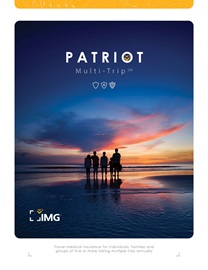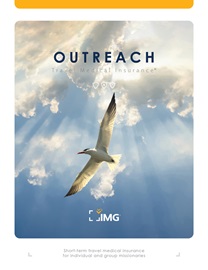Insurance
Choose the plan that meets your needs and spend more time enjoying your international experience not worrying about your insurance coverage.
Find Your PlanWhat type of coverage
do you need?
Travel Medical
Insurance
Temporary coverage for accidents, sicknesses, & emergency evacuations when visiting or traveling outside of your home country.
International Health Insurance
Annually renewable international private medical insurance coverage for expats and global citizens living or working internationally.
Travel
Insurance
Coverage designed to protect you from financial losses should your trip be delayed, interrupted, or cancelled.
Enterprise Services
Meet your duty of care obligations with confidence, knowing your travelers are safe, healthy, and connected wherever they may be in the world.
Show ServicesWhat type of organization do you represent?
Medical & Travel
Assistance
Your travelers can access 24/7 global support should they need medical attention, travel assistance, or medical transport services.
Global Workers' Compensation Case Management
Rest assured knowing you have an experienced team who is committed to reducing your costs, moving your files forward, and serving as an international resource for all your work injury claims.
Security Assistance
Services
Keep your travelers safe, no matter where they are, with real-time alerts and intelligence on safety, health, political, and other global risks.
Insurance Administrative
Services
You’ll have experts to guide you through all things related to your health care plan needs, from enrollment to claim reimbursement.

Travel Medical Insurance
See Prices & Compare Our Travel Medical Plans
Travel Medical Insurance protects you in the event of an illness or injury when traveling outside of your country of residence. It provides key medical benefits in case of an emergency.
Traveling abroad is an exciting experience, but unpredictable illnesses and accidents can happen. Even worse, the resulting medical bills can be overwhelming. The level of international medical coverage provided by your domestic insurance provider can vary greatly depending on your plan, so you may have very limited coverage or no coverage at all. A travel medical insurance plan can provide the coverage you need. For more information, check out our blog: "How to Choose the Best Travel Medical Insurance Plan."
Travel medical coverage is ideal for:
- International vacationers
- Relatives visiting from overseas
- People going on cruises, safaris or guided tours
- International business travelers
- Students studying abroad
International Medical Group® (IMG®) also offers travel insurance that protects your health as well as your trip costs and travel expenses. And if you need long-term medical coverage, check out our international health insurance. IMG plans include a wide range of medical benefits, protection, and support should a problem arise.
Popular Travel Medical Plans
Ideal for Traveling Outside of Your Home Country
Additional Travel Medical Insurance Plans

Patriot Lite Travel Medical Insurance
Temporary health insurance for individuals, families, and groups when traveling outside of your home country.

Visitors Care
Temporary fixed coverage health insurance for non-U.S. residents when traveling outside of your home country.

Student & Scholar Insurance
Student health insurance plans tailored to fit the needs of international students involved in educational or cultural exchange.

GlobeHopper Senior
Temporary health insurance for travelers age 65+ when traveling outside of your home country.

Patriot Multi-Trip Travel Medical Insurance
Annual multi-trip travel medical insurance for individuals, families and groups.

Outreach Travel Medical Insurance
Temporary health insurance for missionaries and mission groups when traveling outside of your home country.

Why Do I Need Travel Medical Insurance?
Depending on where you travel, you may encounter language and currency barriers that prevent you from accessing high-quality medical care. Check out IMG’s Why You Need Travel Medical Insurance Now More Than Ever to learn more about some of these challenges.
Traveling unprotected can leave you vulnerable to paying high out-of-pocket medical expenses, and navigating a foreign health care system without the assistance you need.
However, with a travel medical insurance plan, you can worry less and experience more knowing you have medical coverage and a trusted health advisor who can support you in your time of need.
Get even more information by checking out our article, “Do I Need Travel Medical Insurance?”

How Much Does Travel Medical Insurance Cost?
Less than $3 per day for an average plan.
Like other travelers, you may be wondering if the coverage is worth the cost. It may surprise you to learn that IMG’s travel medical plans can cost less than $3 per day (based on an average plan) and can provide coverage worth well beyond your initial cost. Pick a plan and get protected.
Factors that Determine Cost
The cost of a plan varies based on many factors including:

Age of Traveler
Age is one of the primary factors that determines insurance rates. Each IMG plan has a complete breakdown of insurance rates based on ages that can be found in the plan brochure.

Destination
Medical expenses vary around the world. To provide the best balance of coverage and cost, plan coverage rates may be different for a traveler visiting the United States than they are for a traveler in a destination where healthcare is less expensive.

Duration of Trip
A breakdown of daily rates and monthly rates can be found in IMG plan brochures. If you need long-term coverage (1 year or more), view our international health insurance plans.

Deductible, Maximum Limit, & Additional Optional Coverage
Customize your plan by choosing the deductible amount, maximum limit, and any optional rider that is best for you.

When Is Travel Health Insurance required?
Some countries may require you to purchase travel health insurance to gain entry.
Traveling to Schengen Countries
Schengen countries require visa applicants to prove they have travel medical insurance to cover expenses for repatriation, urgent medical attention, emergency hospital treatment and more. Read our blog about Countries that Require Travel Medical Insurance for Entry to learn more.
Other Situations
You may also be required to purchase travel health insurance depending on the purpose of your trip. The U.S., for example, requires those traveling on a J1 or J2 visa to maintain a certain level of medical coverage for the duration of their stay. However, if you're visiting the U.S. on a B2 visa, a travel medical insurance plan is only recommended. Find out How to Choose the Best Visitor Insurance Plan for You.
Travelers embarking on other trips — such as organized tours, working holiday schemes, mission trips, and cruises — may also be required to purchase coverage.
These are just a few reasons when you would be required to purchase Travel Medical Insurance. See the full list for 6 Times You Need to Purchase Travel Medical Insurance.
Recent Blog Articles
How to File an Insurance Claim
IMG has compensated the author for providing this article.
My husband Chris and I have been traveling and working around the world for more than 10 years. We’ve climbed to the top of trees higher than Niagara Falls, swam with a dozen bull sharks in the Pacific Ocean, and hiked in the remote backcountry of New Zealand.
Although we have managed to stay safe and healthy for most of our travels, we have experienced our fair share of emergencies, including the time Chris got bit by a stray dog at a Buddhist temple in Thailand – but that’s a whole other story.
Even then, we were confident in our IMG coverage and have always had the support we needed when seeking treatment and learning how to submit an insurance claim. Should you happen to find yourself on the road and needing to file a claim, here are answers to frequently asked questions that can help you navigate the claim process.
How do I submit an insurance claim?
First, you're going to need good travel, travel medical, or international health insurance coverage - these are a few good options:
- iTravelInsured Travel Insurance for domestic and international destinations, ideal for vacationers and business travelers looking for trip protection coverage
- Patriot Travel Medical Insurance for shorter international trips, great for holidays and vacationers looking for medical coverage
- Global Medical Insurance for extended time away from home, ideal for expats and global citizens
Whether you receive treatment for an injury, your baggage is delayed, or you must interrupt your trip, you should always submit a claim to IMG as soon as possible. If you're filing a medical claim, alerting IMG lets them know that you are receiving treatment. Filing a travel insurance claim is also the first step in being reimbursed for your prepaid, nonrefundable trip expenses.
Follow these steps to submit an insurance claim:
Step 1: Collect itemized receipts.
In many instances, especially if you are traveling abroad, you might need to pay medical bills at the time of service and then submit a claim for reimbursement. It is imperative that you ask for itemized receipts that detail the services or treatment you received and a medical report including diagnosis. Ask if receipts can be printed on official letterhead or if there is a stamp with appropriate contact information that can be put on the supporting documents. I also grab a couple business cards so I have a quick and easy way to reference which facilities I visited.
Step 2: Submit your claim.
Claims can be submitted through the MyIMG online member portal.
- For travel insurance claims, follow the prompts to complete the claim form; this includes information on the prepaid expenses for which you are seeking reimbursement or medical services you received.
- For international medical insurance claims, follow the prompts to complete the claim form; this includes information on all related medical expenses and supporting documents.
You will be asked to attach appropriate documentation related to your claim, such as receipts, so be sure to have all the necessary documents on hand, and black out any credit card information that is visible. You can scan the documents or use your phone to take pictures of them, and then you can upload them to the portal. Make sure the pictures or scanned copies are in focus, legible, and the contact information is easy to find. It’s important to note that you will not be able to complete the electronic claim form without these supporting documents.
For more information on how to navigate the MyIMG online member portal, review this MyIMG guide.
Step 3: Monitor Your Claim's Progress
Once your claim has been submitted, your claim will then be reviewed by the IMG claims department to ensure all appropriate information and documents have been received. If anything is missing, you will be notified to supply the additional information. After all information and documentation is verified, your claim will move to the final evaluation stage. Once your claim has been processed, you should receive an Explanation of Benefits (EOB) with details of your claim.
- For travel insurance claims, you will be notified of your claim’s status via email and/or text messages.
- For international medical insurance claims, you can log in to MyIMG to track your claim’s progress. Please note that it may take up to 12 hours for any new claims to appear.
Answers to Travel Health Insurance Claims FAQs
How long does it take to process a claim?
The timeline for processing a claim can vary depending on the completeness of the original submission. If everything is submitted correctly, your claim could be processed quickly. Be sure to note that the process can be delayed if you are required to submit additional information to complete your claim request. If this is the case, processing times could take up to a few months. Make sure to review your Explanation of Benefits carefully to ensure IMG has everything needed.
It really pays to take the time to fill out your claim neatly, accurately, and completely the first time. IMG has a team of in-house staff working as quickly as possible to adjudicate claims every day, and personally, all my claims with IMG have been processed and delivered in less than 30 days.
How do I get reimbursed?
Direct deposit is the recommended method to receive your reimbursement as quickly and securely as possible. If your mailing address on file with IMG is within the U.S., your claim reimbursement can also be issued through a mailed check. If your mailing address on file with IMG is outside the U.S., your claim reimbursement can also be issued through a wire transfer.
For international medical insurance claims, the amount you receive is based on eligible medical expenses after applying your deductible and co-insurance or out-of-pocket expenses per the plan wording.
If you are a long-term traveler like me, it may be worthwhile to designate a power of attorney who is authorized on your behalf to deposit checks and handle other financial matters for you while you’re traveling.
What if the amount of my claim is low and I know I still have to meet my deductible — is it worth filing a claim?
Yes! You should always submit a claim regardless of the amount of the expense or whether you’ve met your deductible.
It is important for IMG to be aware of any charges filed on your behalf. Plus, if you’re traveling for an extended period, the medical expenses you paid out of pocket will be applied to your deductible in the event you need to file another claim in the future.
As a traveler, I understand that submitting a claim may not be the best part of your trip. But in my experience, it has been a seamless and painless process that ultimately gives me peace of mind. This is what insurance is for, after all!
For over a decade, Tiffany Soukup has traveled to more than 35 countries with her husband Chris, hiking into remote jungles, looking for endangered wildlife and seeking adventures. Tiffany has been an IMG member since 2007.
Disclaimer
This is not an offer to enter into an insurance contract. This is only a summary and shall not bind the company or require the company to offer or write any insurance at any particular rate or to any particular group or individual. The information on this page does and will not affect, modify or supersede in any way the policy, certificate of insurance and governing policy documents (together the "Insurance Contract"). The actual rates and benefits are governed by the Insurance Contract and nothing else. Benefits are subject to exclusions and limitations.


